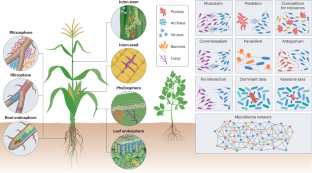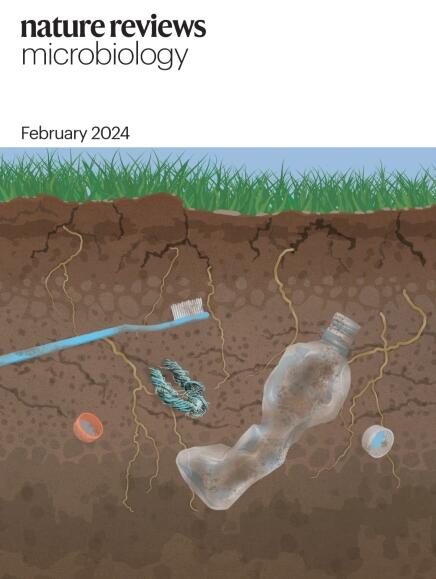利用植物微生物群促进可持续作物生产
IF 103.3
1区 生物学
Q1 MICROBIOLOGY
引用次数: 0
摘要
全球对植物微生物群的研究加深了我们对植物与微生物之间复杂相互作用的了解。植物相关微生物的结构和功能,以及影响植物微生物群有益特性的遗传、生化、物理和代谢因素也得到了深入研究。面对气候变化、非生物和生物压力以及土壤特性下降等一系列挑战,利用植物微生物组开发了各种微生物应用,以提高作物产量。几十年来,微生物,特别是固氮根瘤菌、菌根和生物控制剂,一直被用于改善植物营养和健康。但在田间条件下,其功效和一致性仍有局限性。此外,有关微生物组多样性、功能和相互作用的知识不断丰富,为新型应用提供了巨大的信息来源。在本综述中,我们将探讨植物微生物组的功能、机制、组装和相互作用类型,并讨论当前的应用及其陷阱。此外,我们还阐述了植物微生物组研究的最新发现可能会如何促进开发新的或更先进的应用。最后,我们讨论了在充分利用微生物组功能促进可持续植物生产方面存在的研究空白。本文章由计算机程序翻译,如有差异,请以英文原文为准。


Harnessing the plant microbiome for sustainable crop production
Global research on the plant microbiome has enhanced our understanding of the complex interactions between plants and microorganisms. The structure and functions of plant-associated microorganisms, as well as the genetic, biochemical, physical and metabolic factors that influence the beneficial traits of plant microbiota have also been intensively studied. Harnessing the plant microbiome has led to the development of various microbial applications to improve crop productivity in the face of a range of challenges, for example, climate change, abiotic and biotic stresses, and declining soil properties. Microorganisms, particularly nitrogen-fixing rhizobia as well as mycorrhizae and biocontrol agents, have been applied for decades to improve plant nutrition and health. Still, there are limitations regarding efficacy and consistency under field conditions. Also, the wealth of expanding knowledge on microbiome diversity, functions and interactions represents a huge source of information to exploit for new types of application. In this Review, we explore plant microbiome functions, mechanisms, assembly and types of interaction, and discuss current applications and their pitfalls. Furthermore, we elaborate on how the latest findings in plant microbiome research may lead to the development of new or more advanced applications. Finally, we discuss research gaps to fully leverage microbiome functions for sustainable plant production. In this Review, Compant et al. explore the functions, mechanisms, assembly and interactions of plant microbiomes, highlighting current applications and their limitations. They also discuss how recent advances could lead to new or improved applications and identify research gaps crucial for harnessing microbiome functions in sustainable plant production.
求助全文
通过发布文献求助,成功后即可免费获取论文全文。
去求助
来源期刊

Nature Reviews Microbiology
生物-微生物学
CiteScore
74.00
自引率
0.50%
发文量
149
审稿时长
6-12 weeks
期刊介绍:
At Nature Reviews Microbiology, our goal is to become the leading source of reviews and commentaries for the scientific community we cater to. We are dedicated to publishing articles that are not only authoritative but also easily accessible, supplementing them with clear and concise figures, tables, and other visual aids. Our objective is to offer an unparalleled service to authors, referees, and readers, and we continuously strive to maximize the usefulness and impact of each article we publish. With a focus on Reviews, Perspectives, and Comments spanning the entire field of microbiology, our wide scope ensures that the work we feature reaches the widest possible audience.
 求助内容:
求助内容: 应助结果提醒方式:
应助结果提醒方式:


